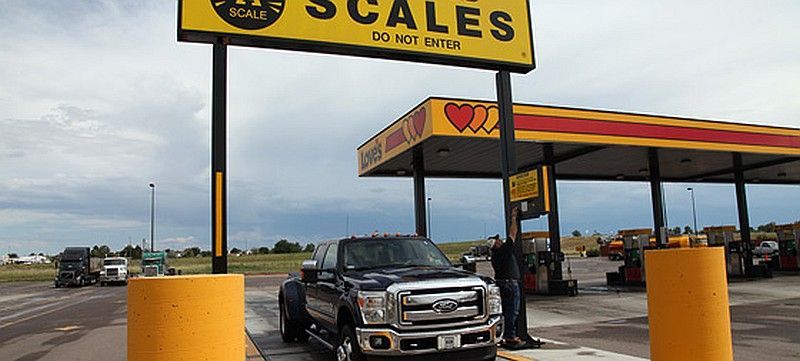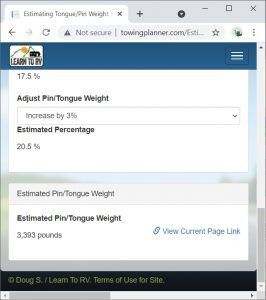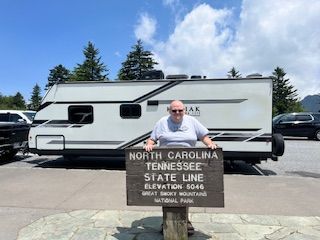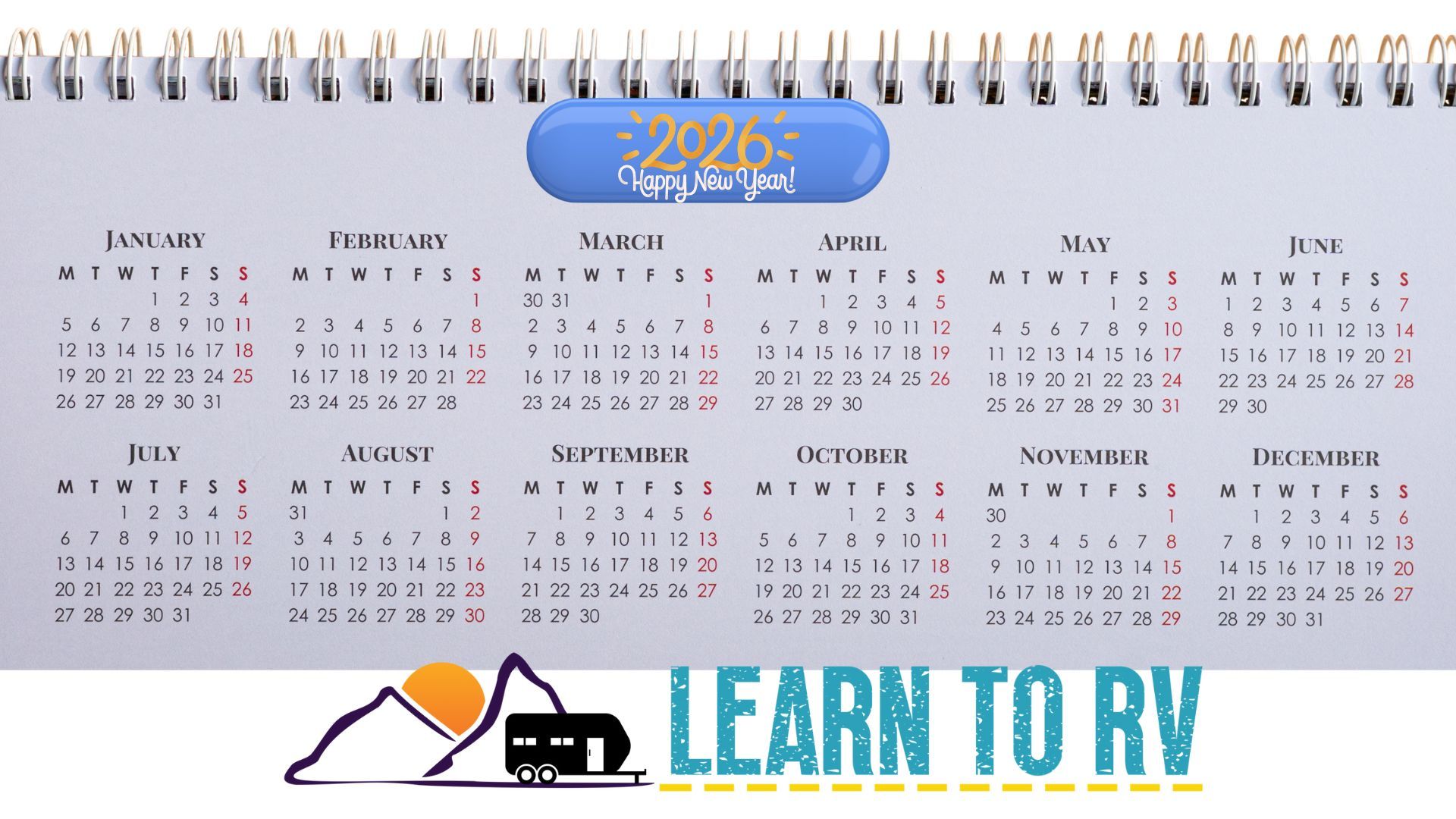Can My Truck/SUV Tow This RV Trailer?
April 6, 2025
You have your truck, SUV, or even car and you need to figure out if you can tow a specific trailer, be it a travel trailer, a pop-up, a hybrid, or even a fifth wheel. Looking at the tow rating isn’t enough. There are a variety of ratings that you need to take a look at.
This is a big topic and can sometimes be hard to navigate, but it may be perfect for an “ask the expert” session with me through Virtual RV Coaching. I can walk you through your truck/tow vehicle and talk you through your RV selection to help identify if it’s a good fit ratings-wise.
So first, we need to talk about hitch weight which is called tongue weight for travel trailers and the like and pin weight for fifth wheels. This is the percentage of the trailer’s weight that is carried by the truck.
Tongue weight for travel trailers is typically between 10-15% of the overall trailer’s weight.
Pin weight for fifth wheels is typically between 20-25% (but sometimes as low as 16% for the oddball layout) of the overall trailer’s weight.
Now that we have that out of the weigh ( get it? “way” ; I’ll see myself out), let’s talk about the various ratings that are applicable when towing.
Ratings
There are a variety of ratings that we need to talk through in order to know what a vehicle can tow. Looking at just the “tow rating” (we’ll talk about that below) leaves you with the possibility of very easily overloading other ratings.
Tow Ratings
The tow rating that you see most commonly mentioned, plans for a 150 pound driver and literally nothing else in the truck. Then it also plans for 10% of tongue weight from the camper. That’s the absolute bare minimum that you want as a tongue weight since 10% and lower can lead to catastrophic sway. I have friends who went fulltime as a family who did a 180° with their truck and camper on their first day out due to low tongue weight and too small of a tow vehicle.
You should look at the tow rating and all other ratings. Some people are fine with exceeding one or more ratings. It’s not for me- heck, I upgraded a 2012 dually to a 2018 dually because I was uncomfortable exceeding a few ratings. Though, I’m not here to wag my finger at anyone.
Gross Vehicle Weight Rating (GVWR)
The truck itself is rated to “carry” a specific amount of weight. That’s the truck itself, driver, passengers, cargo (in the cab and in the truck bed), any modifications done to the truck (topper, bed mat, cattle guard, racks, etc.), and the tongue weight from the camper. Since 2006-ish, this is found on a sticker on the doorjamb.
Gross Axle Weight Rating (GAWR)
The truck rides on 2 axles. These axles are designed to carry up to a maximum amount of weight. Generally speaking, the front axle doesn’t increase much when towing (in fact, with travel trailers, it loses weight which you don’t necessarily want and will need to use a weight distributing hitch to push weight back up front). So you’re specifically looking at the “rear GAWR” or “rear gross axle weight rating”. Since 2006-ish, this is also found on the doorjamb on a sticker.
Tire Loading Capacity
The axles ride on tires, those funky black circular things. They are rated to carry a specific amount. Again, the front tires usually aren’t an issue, so it’s the rear tires that you need to focus on. Finding this sucks, you have to get down on the ground and really look on the tire. It’s molded into the sidewall and will read something like “Max Load single: 3650 lbs. at 65 psi. cold”.
Ok, now armed with your ratings- let’s figure out what the heck to do with them all.
Weigh the Truck
Definitely go take the truck to be weighed at a truck stop. Get separate weights for the front/steer and rear/drive axles. Take the whole family, like you normally would travel for camping. You can go to almost any truck stop, they have what are called “CAT Scales”. These are scales that the truckers use to make sure their loads are legal.
Weigh My Truck App
Going to the CAT scale can be intimidating. To make it easier, you can install an app on your phone called Weigh My Truck. This saves you from stretching to reach a call button and shouting into it. And then saves you from having to run inside to get a paper weigh slip.
How To Weigh the Truck
You just simply pull onto the scale so that you’re in-line with the speaker call box. This should put your front axle on one scale and your rear axle on another, which is the way it should be. Press the button and talk to the tiny person inside the box or use the app. Easy squeezy.

Time to Digest this all for YOU
Estimating That Camper’s Hitch Weight
 The advertised pin/tongue weight on manufacturer’s sites are misleading at best. At worst, they lead people to make bad decisions on what their vehicles can pull. The advertised hitch weights are calculated with a 100% empty trailer and don’t include the battery; some manufacturers don’t even include propane in the tank.
The advertised pin/tongue weight on manufacturer’s sites are misleading at best. At worst, they lead people to make bad decisions on what their vehicles can pull. The advertised hitch weights are calculated with a 100% empty trailer and don’t include the battery; some manufacturers don’t even include propane in the tank.
So, what do you do? You need to calculate a pin/tongue weight for the camper loaded like you would for travel. For weekenders, it’s often said that they’ll load somewhere in the ballpark of 1,500 pounds (obviously, this is lower for small rigs and higher for big rigs). Fulltimers have different weight requirements, you’re going to want to use the RV’s maximum weight rating (it has its own gross vehicle weight rating/GVWR which is usually shown on the doorjamb leading into the RV).
To make calculation easy, you can use a tool that I created:
Estimating Tongue/Pin Weight from Dry Weights – TowingPlanner
Comparing against GVWR
Now, let’s check your truck’s gross vehicle weight rating (GVWR). Again, this is what the truck is designed to carry. You’ll simply take that calculated hitch weight and add it to what the truck weighs.
Are those 2 above or below the truck’s GVWR? Is it a lot over? What’s your comfort/cutoff for being over?
Comparing against the rear GAWR
Generally speaking, hitch weight is carried by the rear axle. For travel trailers, it does get spread around a little by a weight distributing hitch, but for planning purposes, let’s assume it isn’t. Take that calculated hitch weight and add it to the rear/drive axle weight from the scale.
Again, are you above or below the truck’s GAWR? Is it a lot over? What’s your comfort/cutoff for being over?
Comparing against the Tire Load Capacity
Take the number you just calculated for the rear axle. This same weight is going to be carried by the rear tires.
Are you under or over? If over, stop. Don’t go over on the rubber, you’re just asking for problems.
Whew, You Made it Here
You deserve a dang prize for reading all of this! You can’t make any decisions unless you’re armed with data.
Now, with that all said- towing isn’t black and white. I know folks who aren’t willing to exceed any ratings and others who are willing to exceed one or many ratings, sometimes by a lot. And some, sadly, have no idea what their weights even are. Your experience with trucks and towing will guide you. Though, I strongly recommend newbies err on the side of caution and ratings (believe me- I was there!).
So good luck and let me know if you have any questions.













